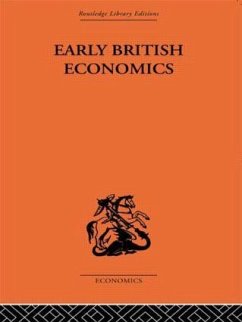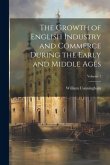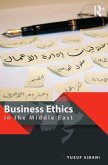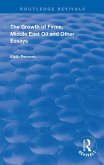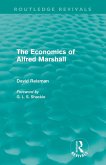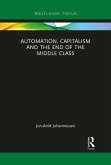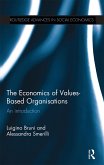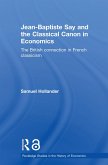Max Beer
Early British Economics from the XIIIth to the middle of the XVIIIth century
Max Beer
Early British Economics from the XIIIth to the middle of the XVIIIth century
- Broschiertes Buch
- Merkliste
- Auf die Merkliste
- Bewerten Bewerten
- Teilen
- Produkt teilen
- Produkterinnerung
- Produkterinnerung
Early British Economics covers the growth of economic thought in Britain, giving an outline of the economic and ethical problems raised by social developments and changes. The doctrines formulated by city merchants, economic writers and philosophers during the six centuries in question are also examined.
Andere Kunden interessierten sich auch für
![The Growth of English Industry and Commerce During the Early and Middle Ages; Volume 1 The Growth of English Industry and Commerce During the Early and Middle Ages; Volume 1]() William CunninghamThe Growth of English Industry and Commerce During the Early and Middle Ages; Volume 129,99 €
William CunninghamThe Growth of English Industry and Commerce During the Early and Middle Ages; Volume 129,99 €![Business Ethics in the Middle East Business Ethics in the Middle East]() Yusuf SidaniBusiness Ethics in the Middle East54,99 €
Yusuf SidaniBusiness Ethics in the Middle East54,99 €![The Growth of Firms, Middle East Oil and Other Essays The Growth of Firms, Middle East Oil and Other Essays]() Edith PenroseThe Growth of Firms, Middle East Oil and Other Essays49,99 €
Edith PenroseThe Growth of Firms, Middle East Oil and Other Essays49,99 €![The Economics of Alfred Marshall (Routledge Revivals) The Economics of Alfred Marshall (Routledge Revivals)]() David ReismanThe Economics of Alfred Marshall (Routledge Revivals)56,99 €
David ReismanThe Economics of Alfred Marshall (Routledge Revivals)56,99 €![Automation, Capitalism and the End of the Middle Class Automation, Capitalism and the End of the Middle Class]() Jon-Arild JohannessenAutomation, Capitalism and the End of the Middle Class30,99 €
Jon-Arild JohannessenAutomation, Capitalism and the End of the Middle Class30,99 €![The Economics of Values-Based Organisations The Economics of Values-Based Organisations]() Luigino BruniThe Economics of Values-Based Organisations58,99 €
Luigino BruniThe Economics of Values-Based Organisations58,99 €![Jean-Baptiste Say and the Classical Canon in Economics Jean-Baptiste Say and the Classical Canon in Economics]() Samuel HollanderJean-Baptiste Say and the Classical Canon in Economics71,99 €
Samuel HollanderJean-Baptiste Say and the Classical Canon in Economics71,99 €-
-
-
Early British Economics covers the growth of economic thought in Britain, giving an outline of the economic and ethical problems raised by social developments and changes. The doctrines formulated by city merchants, economic writers and philosophers during the six centuries in question are also examined.
Produktdetails
- Produktdetails
- Verlag: Routledge
- Seitenzahl: 254
- Erscheinungstermin: 18. Oktober 2010
- Englisch
- Abmessung: 216mm x 140mm x 14mm
- Gewicht: 325g
- ISBN-13: 9780415607148
- ISBN-10: 0415607140
- Artikelnr.: 57044307
- Herstellerkennzeichnung
- Libri GmbH
- Europaallee 1
- 36244 Bad Hersfeld
- gpsr@libri.de
- Verlag: Routledge
- Seitenzahl: 254
- Erscheinungstermin: 18. Oktober 2010
- Englisch
- Abmessung: 216mm x 140mm x 14mm
- Gewicht: 325g
- ISBN-13: 9780415607148
- ISBN-10: 0415607140
- Artikelnr.: 57044307
- Herstellerkennzeichnung
- Libri GmbH
- Europaallee 1
- 36244 Bad Hersfeld
- gpsr@libri.de
M. Beer
Part 1. The Schoolmen and their problems 1. The Beginning of Scholasticism
in the British Isles 2. Commerce and Ethics 3. Growth of Trade and Commerce
4. Conflict between Ethics and Economics Part 2. Alexander of Hales
(Alensis) 1. Community and Private Property 2. Trade and Commerce 3.
Aristotle and the Schoolmen 4. Usury Part 3. Richardus de Media Villa 1.
Community and Liberty 2. Lawfulness of Trade and Commerce 3. Difference
between Gain and Interest Part 4. John Duns Scotus 1. Remarks on his Life
and Work 2. Origin of Property and State 3. Trade and Commerce 4. Usury
Part 5. The Legacy of the Schoolmen 1. Preparing the Way for Modern Times
2. William of Ockham 3. Influence on Modern Views Part 6. The Age of
Mercantilism: General View 1. Definition of Mercantilism 2. Importance of
Coin and Bullion 3. The Mechanism of Bullionist Policy 4. The Ethics of the
Angevin Trade Legislation 5. The Two Periods of Mercantlism Part 7.
Sixteenth Century Economics 1. Price Revolution and Money Difficulties 2.
The 'Dearth' and Debasement of the Coinage 3. John Hales on the Nature of
Money 4. Influx of West Indian Treasure 5. Delivering Money by Exchange 6.
Gerard Malynes and Thomas Milles against Exchangers 7. Excess of Imports 8.
The Prime Cause of the Economic Difficulties 9. The Quantity Theory of
Money: John Locke Part 8. Balance of Trade 1. Mediaeval and Modern
Conception of Trading 2. Rise of the term Balance of Trade 3. Origin of
Some Ideas of the Balance of Trade 4. Thomas Mun and Edward Misselden 5.
Influence of the Balance of Trade Doctrine Part 9. Importance of
Manufacture 1. Arts and Crafts as a Source of Treasure 2. Beginning of the
Protective System 3. Sir William Petty on Money, Value and International
Trade 4. Petty and his Contemporaries on Labour, Population and Wages 5.
Conflict between Crown and Merchants Part 10. Recapitualation 1. Meaning of
the Balance of Trade 2. Mercantilism and Foreign Politics Part 11.
Transition to Liberal Economics 1. Introductory Remarks 2. Manufacture,
Credit, Banking and Free Trade 3. The Ant-Mercantilists: Child, Barbon,
Davenant 4. The Free-Trade Maxims of Dudley North 5. The Economics of the
Free-Trade Doctrine 6. Jacob Vanderlint, Matthew Dekker, and Joseph Massie
7. David Hume Retrospect: British Economies in 1750
in the British Isles 2. Commerce and Ethics 3. Growth of Trade and Commerce
4. Conflict between Ethics and Economics Part 2. Alexander of Hales
(Alensis) 1. Community and Private Property 2. Trade and Commerce 3.
Aristotle and the Schoolmen 4. Usury Part 3. Richardus de Media Villa 1.
Community and Liberty 2. Lawfulness of Trade and Commerce 3. Difference
between Gain and Interest Part 4. John Duns Scotus 1. Remarks on his Life
and Work 2. Origin of Property and State 3. Trade and Commerce 4. Usury
Part 5. The Legacy of the Schoolmen 1. Preparing the Way for Modern Times
2. William of Ockham 3. Influence on Modern Views Part 6. The Age of
Mercantilism: General View 1. Definition of Mercantilism 2. Importance of
Coin and Bullion 3. The Mechanism of Bullionist Policy 4. The Ethics of the
Angevin Trade Legislation 5. The Two Periods of Mercantlism Part 7.
Sixteenth Century Economics 1. Price Revolution and Money Difficulties 2.
The 'Dearth' and Debasement of the Coinage 3. John Hales on the Nature of
Money 4. Influx of West Indian Treasure 5. Delivering Money by Exchange 6.
Gerard Malynes and Thomas Milles against Exchangers 7. Excess of Imports 8.
The Prime Cause of the Economic Difficulties 9. The Quantity Theory of
Money: John Locke Part 8. Balance of Trade 1. Mediaeval and Modern
Conception of Trading 2. Rise of the term Balance of Trade 3. Origin of
Some Ideas of the Balance of Trade 4. Thomas Mun and Edward Misselden 5.
Influence of the Balance of Trade Doctrine Part 9. Importance of
Manufacture 1. Arts and Crafts as a Source of Treasure 2. Beginning of the
Protective System 3. Sir William Petty on Money, Value and International
Trade 4. Petty and his Contemporaries on Labour, Population and Wages 5.
Conflict between Crown and Merchants Part 10. Recapitualation 1. Meaning of
the Balance of Trade 2. Mercantilism and Foreign Politics Part 11.
Transition to Liberal Economics 1. Introductory Remarks 2. Manufacture,
Credit, Banking and Free Trade 3. The Ant-Mercantilists: Child, Barbon,
Davenant 4. The Free-Trade Maxims of Dudley North 5. The Economics of the
Free-Trade Doctrine 6. Jacob Vanderlint, Matthew Dekker, and Joseph Massie
7. David Hume Retrospect: British Economies in 1750
Part 1. The Schoolmen and their problems 1. The Beginning of Scholasticism
in the British Isles 2. Commerce and Ethics 3. Growth of Trade and Commerce
4. Conflict between Ethics and Economics Part 2. Alexander of Hales
(Alensis) 1. Community and Private Property 2. Trade and Commerce 3.
Aristotle and the Schoolmen 4. Usury Part 3. Richardus de Media Villa 1.
Community and Liberty 2. Lawfulness of Trade and Commerce 3. Difference
between Gain and Interest Part 4. John Duns Scotus 1. Remarks on his Life
and Work 2. Origin of Property and State 3. Trade and Commerce 4. Usury
Part 5. The Legacy of the Schoolmen 1. Preparing the Way for Modern Times
2. William of Ockham 3. Influence on Modern Views Part 6. The Age of
Mercantilism: General View 1. Definition of Mercantilism 2. Importance of
Coin and Bullion 3. The Mechanism of Bullionist Policy 4. The Ethics of the
Angevin Trade Legislation 5. The Two Periods of Mercantlism Part 7.
Sixteenth Century Economics 1. Price Revolution and Money Difficulties 2.
The 'Dearth' and Debasement of the Coinage 3. John Hales on the Nature of
Money 4. Influx of West Indian Treasure 5. Delivering Money by Exchange 6.
Gerard Malynes and Thomas Milles against Exchangers 7. Excess of Imports 8.
The Prime Cause of the Economic Difficulties 9. The Quantity Theory of
Money: John Locke Part 8. Balance of Trade 1. Mediaeval and Modern
Conception of Trading 2. Rise of the term Balance of Trade 3. Origin of
Some Ideas of the Balance of Trade 4. Thomas Mun and Edward Misselden 5.
Influence of the Balance of Trade Doctrine Part 9. Importance of
Manufacture 1. Arts and Crafts as a Source of Treasure 2. Beginning of the
Protective System 3. Sir William Petty on Money, Value and International
Trade 4. Petty and his Contemporaries on Labour, Population and Wages 5.
Conflict between Crown and Merchants Part 10. Recapitualation 1. Meaning of
the Balance of Trade 2. Mercantilism and Foreign Politics Part 11.
Transition to Liberal Economics 1. Introductory Remarks 2. Manufacture,
Credit, Banking and Free Trade 3. The Ant-Mercantilists: Child, Barbon,
Davenant 4. The Free-Trade Maxims of Dudley North 5. The Economics of the
Free-Trade Doctrine 6. Jacob Vanderlint, Matthew Dekker, and Joseph Massie
7. David Hume Retrospect: British Economies in 1750
in the British Isles 2. Commerce and Ethics 3. Growth of Trade and Commerce
4. Conflict between Ethics and Economics Part 2. Alexander of Hales
(Alensis) 1. Community and Private Property 2. Trade and Commerce 3.
Aristotle and the Schoolmen 4. Usury Part 3. Richardus de Media Villa 1.
Community and Liberty 2. Lawfulness of Trade and Commerce 3. Difference
between Gain and Interest Part 4. John Duns Scotus 1. Remarks on his Life
and Work 2. Origin of Property and State 3. Trade and Commerce 4. Usury
Part 5. The Legacy of the Schoolmen 1. Preparing the Way for Modern Times
2. William of Ockham 3. Influence on Modern Views Part 6. The Age of
Mercantilism: General View 1. Definition of Mercantilism 2. Importance of
Coin and Bullion 3. The Mechanism of Bullionist Policy 4. The Ethics of the
Angevin Trade Legislation 5. The Two Periods of Mercantlism Part 7.
Sixteenth Century Economics 1. Price Revolution and Money Difficulties 2.
The 'Dearth' and Debasement of the Coinage 3. John Hales on the Nature of
Money 4. Influx of West Indian Treasure 5. Delivering Money by Exchange 6.
Gerard Malynes and Thomas Milles against Exchangers 7. Excess of Imports 8.
The Prime Cause of the Economic Difficulties 9. The Quantity Theory of
Money: John Locke Part 8. Balance of Trade 1. Mediaeval and Modern
Conception of Trading 2. Rise of the term Balance of Trade 3. Origin of
Some Ideas of the Balance of Trade 4. Thomas Mun and Edward Misselden 5.
Influence of the Balance of Trade Doctrine Part 9. Importance of
Manufacture 1. Arts and Crafts as a Source of Treasure 2. Beginning of the
Protective System 3. Sir William Petty on Money, Value and International
Trade 4. Petty and his Contemporaries on Labour, Population and Wages 5.
Conflict between Crown and Merchants Part 10. Recapitualation 1. Meaning of
the Balance of Trade 2. Mercantilism and Foreign Politics Part 11.
Transition to Liberal Economics 1. Introductory Remarks 2. Manufacture,
Credit, Banking and Free Trade 3. The Ant-Mercantilists: Child, Barbon,
Davenant 4. The Free-Trade Maxims of Dudley North 5. The Economics of the
Free-Trade Doctrine 6. Jacob Vanderlint, Matthew Dekker, and Joseph Massie
7. David Hume Retrospect: British Economies in 1750

